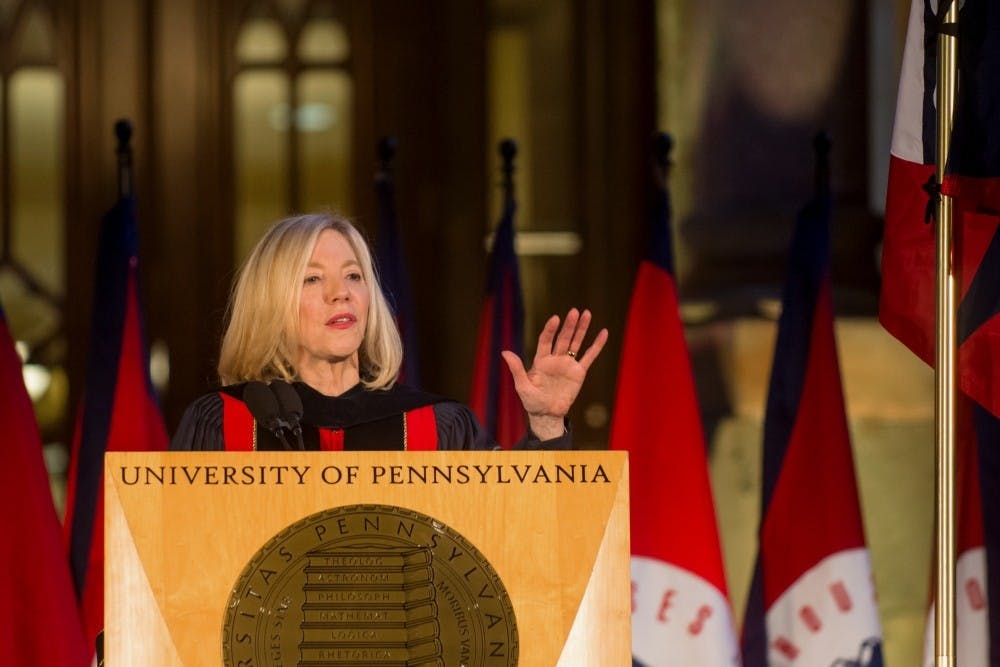
The New York Times' annual conference on higher education this week featured some of Penn's biggest names: Penn President Amy Gutmann and professor Adam Grant.
The Higher Ed Leaders Forum, a two-day conference held on May 31 and June 1 in New York City, brought together leaders from universities such as Penn and Harvard University to discuss free speech, race relations and other issues affecting colleges today.
Organizers of the conference have not responded to request for comment.
In a panel entitled "Education in the Post-Truth Era," Gutmann, along with New York Times Executive Editor Dean Baquet and Media Columnist Jim Rutenberg, sought to find a common goal between journalism and education: "seeking and discovering the truth."
Gutmann began her remarks by objecting to the title of the panel, insisting, "I would not call it 'post-truth' as an era any more than I would call our era 'post-racial' or 'the end of history.'"
Gutmann was careful not to label the phenomena of "fake news" and "alternative facts" as limited to the Trump administration, but rather as symptoms of a larger trend in society.
She said, however, that this trend "threatens the very fabric of democracy, and it's not exaggeration to say, if let un-responded to, it would threaten the very basis of civilization."
When the issue of free speech on college campuses was raised, Gutmann praised Penn's Campaign for Community, a program of events encouraging students and faculty to engage in uncomfortable conversations, and its policy of employing Open Expression Observers to monitor events.
While rising Wharton sophomore Ghali Benlafkih agreed with Gutmann's stance on fake news, he said he was disappointed that Gutmann did not sufficiently address ideological "bubbles" on campus.
"I'm a liberal," Benlafkih said, "but I think that since Penn leans liberal, the administration tends to disregard conservative students and their demands sometimes, which she doesn't acknowledge in the interview."
Gutmann's chat with the Times is one of her rare conversations with journalists in recent months. She speaks to The Daily Pennsylvanian only once a semester in a 25-minute meeting with a small group of editors. Outside of that meeting, Gutmann has only sparingly spoken to outside media outlets — a 30-minute conversation with Philadelphia Magazine in the fall for a profile being a recent exception.
In his panel, Wharton professor Adam Grant discussed ways colleges can "normalize struggle" with former Stanford University Dean of Freshmen Julie Lythcott-Haims.
"I've been trying my whole career, since the day I arrived at Penn, to open up about my own failures in the classroom," said Grant, who is a vocal critic of Penn's "hyper-competitive" culture.
For years, Grant has presented a "failure resume" to his students, which is a list of his own personal failures. He found that not all students found this helpful as these were all struggles that he had already overcome. When Grant opened up about ongoing family challenges, three students personally emailed Grant, telling him, "It was the first moment where they felt like their professor was human."
Grant also criticized Penn's system of on-campus recruiting. When asked for an example of risk-averse behavior that can negatively impact one's future, Grant said, "Every student who graduates from Wharton and joins an investment bank."
Shaun Harper, a former professor in the Graduate School of Education and the former executive director of the Center for the Study of Race and Equity in Education, was also at the conference.
He led a presentation on racial equity where he highlighted the racist cyber attack that happened on Penn's campus last November.
Harper touted the Center's work, particularly its campus climate surveys.
"They've literally taken us from Portland Community College to Princeton University and several dozen places in between, in terms of institutional type, size and geography," Harper said.
The Daily Pennsylvanian is an independent, student-run newspaper. Please consider making a donation to support the coverage that shapes the University. Your generosity ensures a future of strong journalism at Penn.
Donate






